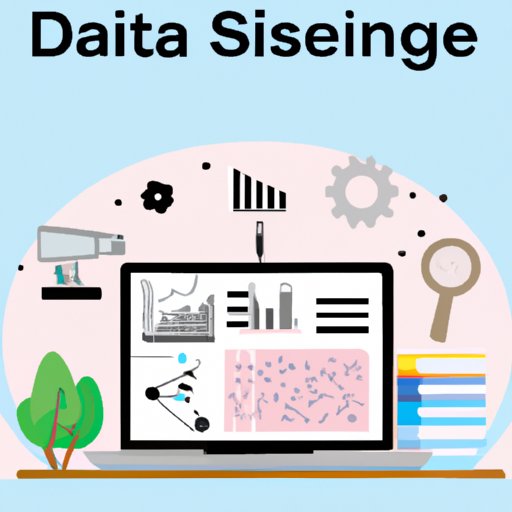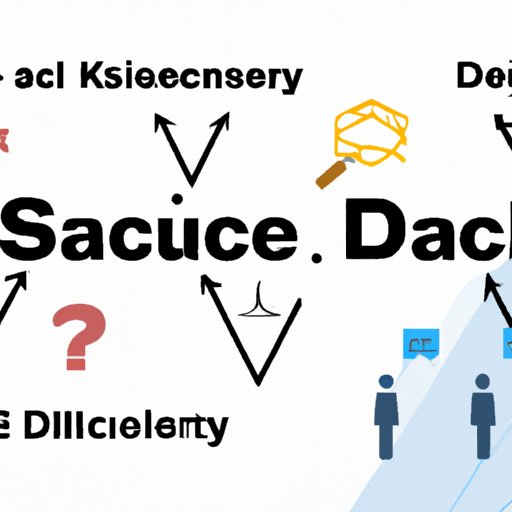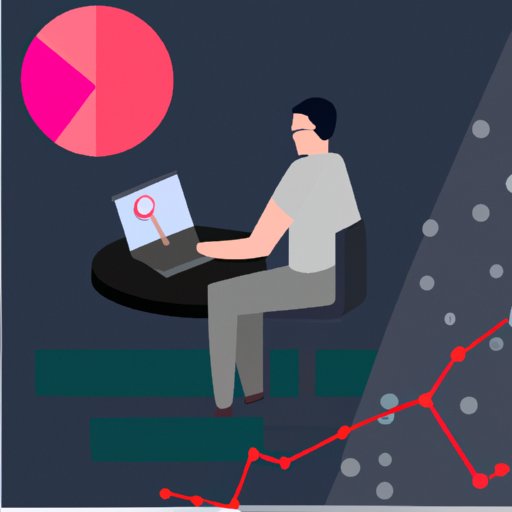Introduction
Data Science is an emerging field that combines mathematics, statistics, programming, and business knowledge to extract insights from large sets of data. This article will provide an overview of what data science is, how it works, and how it is being used in businesses today. We will also explore the different elements of data science and discuss how it can help to solve complex problems.
Exploring the Basics of Data Science: An Overview
Data science is an interdisciplinary field that uses scientific methods, processes, algorithms, and systems to extract knowledge and insights from structured and unstructured data. Data scientists use a range of techniques to collect, clean, analyze, store, and visualize data in order to draw conclusions and make predictions.
Data science covers a range of areas including machine learning, artificial intelligence, natural language processing, deep learning, computer vision, and many more. The main types of data science are descriptive, predictive, and prescriptive. Descriptive data science involves exploring and summarizing data to gain insights. Predictive data science involves using data to make predictions about future events. Prescriptive data science involves using data to recommend actions or solutions.
Common tools used in data science include Python, R, SQL, Apache Spark, Hadoop, Tableau, and Power BI. These tools allow data scientists to manipulate and analyze large datasets quickly and efficiently.
What is Data Science and How Does it Work?
Data science involves collecting and analyzing data in order to identify patterns, trends, and relationships that can be used to inform decisions and make predictions. A data scientist is responsible for creating models and algorithms to process and analyze data, as well as designing experiments and visualizing results.
The data science process typically follows four steps: data collection, data cleaning, data analysis, and data visualization. In the data collection stage, data is gathered from various sources such as databases, surveys, and web APIs. The data is then cleaned and preprocessed in order to make it suitable for analysis. In the data analysis stage, statistical methods, machine learning, and other techniques are used to analyze the data and extract meaningful insights. Finally, the data is visualized in order to communicate the results of the analysis.
A Comprehensive Guide to Becoming a Data Scientist
Becoming a data scientist requires a combination of technical and soft skills. Technical skills include programming languages (such as Python and R), databases (such as SQL and NoSQL), and data analysis techniques (such as machine learning and deep learning). Soft skills include problem solving, communication, and critical thinking.
There are several career paths available for those interested in becoming a data scientist. These include data analyst, data engineer, machine learning engineer, and business intelligence analyst. The most common way to become a data scientist is to pursue a master’s degree in data science, computer science, or a related field. Alternatively, there are many online courses and bootcamps available to learn the necessary skills.

Unpacking the Different Components of Data Science
Data collection and storage is an important part of data science. Data is collected from various sources such as databases, surveys, and web APIs. The data is then stored in databases or warehouses for easy access and manipulation.
Data analysis is the process of extracting meaningful insights from data. Data scientists use a range of techniques such as statistical methods, machine learning, and deep learning to analyze data and uncover hidden patterns and relationships.
Data visualization is the process of displaying data in a graphical format in order to communicate results and insights to stakeholders. Popular data visualization tools include Tableau, Power BI, and D3.js.

The Role of Data Science in Businesses Today
Data science has become increasingly important in businesses today, with many organizations relying on data-driven decisions to remain competitive. Data science is used to optimize business processes, identify new opportunities, and improve customer experiences. Examples of how data science is being used in businesses include predictive analytics, customer segmentation, fraud detection, and recommendation engines.
The benefits of using data science are numerous. It helps businesses to increase efficiency, reduce costs, and make better decisions. Data science also allows businesses to gain deeper insights into their customers and markets, allowing them to tailor their products and services accordingly.

How Data Science Can Help Solve Complex Problems
Data science can be used to solve complex problems such as predicting demand, forecasting market trends, and detecting fraud. Data scientists use a range of techniques such as machine learning and deep learning to uncover hidden patterns and relationships in data. By leveraging these insights, data scientists can create models that can be used to predict outcomes and recommend solutions.
Examples of how data science has been used to solve complex problems include disease prediction, self-driving cars, and personalized medicine. Data science is also being used to tackle global challenges such as climate change and poverty.
Conclusion
In conclusion, this article has provided an overview of data science and explored how it is being used in businesses today. We have discussed the different components of data science and outlined how it can help to solve complex problems. Finally, we have looked at the skills and education needed to become a successful data scientist.
(Note: Is this article not meeting your expectations? Do you have knowledge or insights to share? Unlock new opportunities and expand your reach by joining our authors team. Click Registration to join us and share your expertise with our readers.)
